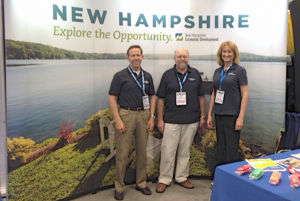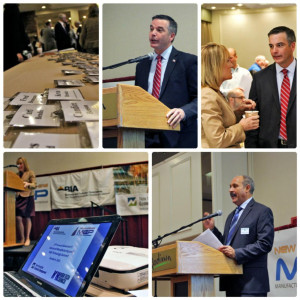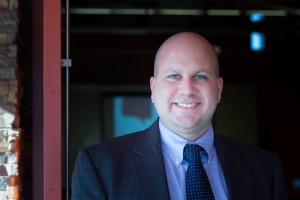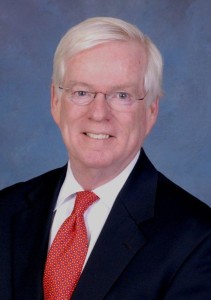Archive for October, 2015
Friday, October 30th, 2015
A business depends on its employees to carry out its mission and an enthusiastic, trained worker adds much value to that business. The Office of Workforce Opportunity brings together the employer and the employee through a number of resources and in today’s 5 Questions, Michael Power, community outreach administrator, explains OWO and what it can do for your business.
1. The Office of Workforce Opportunity oversees the New Hampshire Works/American Job Center System. What programs/services are offered to NH professionals through NH Works and the American Job Center System?
The 12 NH Works Centers/American Job Centers located throughout New Hampshire offer a variety of services to both employers and job seekers, from job search techniques to digital job matching and career counseling to job training. Whether you’re an unemployed high-school dropout and a college-educated experienced professional who suddenly finds themselves out of work, NH Works can bring resources together to address your employment needs.
If you are a professional establishing a start-up, our partnership of state agencies and community-based organizations can help you with tax credits, training new workers, or obtaining the appropriate permits.
It’s important to remember that NH Works is not an agency, but a consortium of agencies, a team dedicated to bringing its resources to help strengthen New Hampshire’s economy. The partnership includes the Office of Workforce Opportunity in the Department of Resources and Economic Development; the Division of Economic Development, also in DRED; the Department of Education; NH Employment Security; Health and Human Resources; the Community College System of New Hampshire and the state’s Community Action agencies. We share our resources to address the needs of workers, job seekers and employers.
2. The vision of OWO is to “serve as a catalyst to establish a secure and sustainable workforce” and “provide a competitive advantage for New Hampshire businesses.” How does OWO fulfill that on a daily basis?
OWO is funded by the US Department of Labor Employment and Training Administration, with guidelines and restrictions on exactly how we utilize our funds. We have a State Workforce Investment Board, a kind of board of directors that oversee our operations and sets specific goals to address New Hampshire workforce needs. The SWIB is appointed by the governor and over half of its 40-membership must come from private industry. As a result, we’re industry-led when determining what targets we should have to establish a successful workforce in New Hampshire.
On a daily basis, that means working with industry to develop career pathways that will build sustainable pipelines for the workers needed by our industries, from hospitality to advanced manufacturing to healthcare. On the worker side, we assist job seekers, from youth to dislocated workers, to discover career paths that will enable them to be productive and contributing members of society – and that includes training funds to help them get the skills they need. We even fund youth programs to address at-risk students.
3. Why do you believe New Hampshire is a terrific place for people to work, live, and grow professionally?
First, quality of life. We’re the safest, healthiest place in America to live, especially for kids. Also, it has incredible natural resources. In addition, we’re small in terms of population, so it’s relatively easy to get to know the people you need to know in every sector of the economy. Our government officials are probably the most accessible in the nation. We’re frugal, so in both our government and private industry, we know how to stretch a buck, with very little waste. We have an entrepreneurial spirit, so there is creativity and a willingness to take a risk without fear of failing. We actually know our neighbors. We have a terrific educational system, especially at the community college level, where we really shine. There is room to succeed in New Hampshire if you dare to be great at whatever you want to do. That’s why the Stay Work Play organization is so important to New Hampshire.
4. Can you share a brief story or two about how OWO helps businesses in the state?
Employers can get confused when they run up against regulations and statutes and rules they are not familiar dealing with their business, and OWO, with its partners in the NH Works system, can stop the bureaucratic runaround of never-ending phone calls and unanswered emails. Because we really depend on a customer-friendly approach, we can find the answer, or locate the appropriate official to help address a business’s question.
In addition, we can walk through programs that the business has likely not heard about – like the Return to Work program that allows an employer to try out a perspective employee for free (even worker compensation costs), or the On-the-Job training program that can cover a significant amount of a new employee in training’s salary.
In short, personalized service that is unheard of in other states. We also administer the $1 million dollar Job Training Fund, a 1:1 matching fund to upgrade worker skills. The Job Training Fund has helped offer training to 25,000 workers in the past decade, generating nearly $20 million in new training programs. And….it’s user-friendly.
5. What’s new or exciting coming up on the horizon for OWO?
Under the Workforce Innovation and Opportunities Act, the new federal legislation under which we are working, we’re initiating new sector strategies, a program that places all the stakeholders of important industry sectors together at the table to discuss and design practices and programs that will create sustainable pipelines of new workers for that industry.
When we find ourselves in a labor shortage in particular industries, like manufacturing, and it does no good for companies to merely steal workers from each other. We need to collaborate with industry leaders, educational facilities, workforce agencies and others in the community to design long-lasting career pathways that help bring more people into the middle class while providing our employers with the opportunity to grow.
Tags: Michael Power, NH Job Training, NH Office of Workforce Opportunity, NH Works
Posted in NH Business Matters | Comments Off on 5 Questions with Michael Power, Office of Workforce Opportunity
Thursday, October 29th, 2015
(NH Division of Economic Development Director Carmen Lorentz takes the reins of today’s blog. –Ed.)
Last week, it was Los Angeles.
This week, it’s Dallas.
Next week, it will be Dubai.
These are the places where the Division of Economic Development is spreading the word about New Hampshire and not just about it being a great place to do business.
In Los Angeles last week, Michael Bergeron, our senior business development manager, attended the CoreNet Global summit, one of the largest events of its kind, bringing together over 2,000 corporate real estate executives and site selectors. Thanks to generous sponsorship by the New Hampshire Commercial Investment Board of Realtors, Michael was able to talk with dozens of people about the benefits of doing business in New Hampshire – our tax climate, our educated workforce, our quality of life and available real estate where it can all begin.
 Michael Bergeron, Debra Mattson, Bret Blanchard at CAMX This week, he’s in Dallas at CAMX, the premier tradeshow for composites and advanced materials. This year, there are over 550 exhibitors and more than 7,000 people are expected to attend. Joining Michael in the New Hampshire booth are Debra Mattson and Bret Blanchard from Great Bay Community College’s advanced composites manufacturing program. They report a brisk business and interest in New Hampshire’s composites industry.
Next week, Tina Kasim, program manager for our Office of International Commerce, heads to the Dubai Air Show, to represent the state in its own booth. She’ll be accompanied by representatives of three businesses – AQYR, located in Hollis; HALO Maritime Defense Systems of Newton; and Transupport of Merrimack. All three companies are members of the New Hampshire Aerospace and Defense Export Consortium.
They are eager to get down to business, meeting decision makers right on the trade show floor. As one of the largest aerospace and defense events in the growing Middle East market, this is the ideal place to showcase New Hampshire innovation and solutions in these industries. Participation the Dubai Air Show is made possible through a State Trade Export Promotion grant.
Our participation at CoreNet Global and CAMX are the first domestic trade shows our business development team has participated in more than five years, thanks to funding included for out-of-state business recruitment in the new state budget.
New Hampshire and its business climate has much to offer companies looking to expand or relocate and Los Angeles, Dallas and Dubai are great places to start telling our story.
 Carmen Lorentz
Carmen Lorentz
Director
NH Division of Economic Development
Tags: Carmen Lorentz, Michael Bergeron, NH business recruitment, tradeshows
Posted in NH Business Matters | Comments Off on Who in the World is Hearing About New Hampshire? If it’s Thursday, it Must Be Dallas
Wednesday, October 28th, 2015
 Nov. 8-12 Three companies, whose capabilities span from the ocean floor to satellite orbit, join the New Hampshire Office of International Commerce next month at the Dubai Air Show (Stand 1856), which will feature more than 1,000 exhibitors representing 60 countries and draw over 60,000 people to five day event.
This will be New Hampshire’s first appearance at the biennial air show, one of the largest trade shows in the Middle East. The Dubai Air Show runs from Nov. 8-12.
The New Hampshire Office of International Commerce booth includes representatives from AQYR of Hollis, provider of satellite communications hardware; HALO Maritime Defense Systems of Newton, designer of sea barriers; and Transupport of Merrimack, a stocking distributor for gas turbine engines. Funding for participation in the air show comes from a State Trade Export Promotion grant. All three companies are members of the New Hampshire Aerospace and Defense Export Consortium.
“This is a premiere event for New Hampshire to showcase its aerospace and defense capabilities,” said Tina Kasim, program manager for the Office of International Commerce, part of the New Hampshire Division of Economic Development. “Our companies are eager to be out in front of the decision makers who will be at the show and as a state, New Hampshire is ready to show how its aero/defense industry can meet the demands of a growing Middle East market.”
The companies’ representatives say their presence at the air show provides valuable exposure.
“Participating in the show gives us the ability to present our product to a worldwide audience, which we could not do on our own,” said Mark Wheeler, director of business development for AQYR. “By being at the Dubai Air Show, we’ll be able to seek out local and regional companies for distribution and sales partnerships. We’ll have access to military, government and commerce officials and all of these together increase our visibility and capabilities in a way we could not achieve on our own.”
HALO Maritime Defense Systems’ CEO Paul Jensen said that even though his company designs defense barriers for use at sea, the government and military officials with whom he needs to connect will be at the air show. Being part of the New Hampshire booth will also be a benefit.
“For American companies, this lends credibility – people trust you and recognize that you are not a ‘suitcase salesman,’” he said.
For Transupport, being visible at an international venue is important.
“It’s a global economy and as a small New Hampshire business, this gives us an opportunity to branch out in an ever changing market,” said company vice president Ken Foote.
With more than 300 companies and manufacturers in the state involved in the aerospace and defense industries, New Hampshire will be one of six states exhibiting at the Dubai Air Show. The Office of International Commerce will promote the industries, highlighting its advanced composites manufacturing capabilities and other innovative technologies.
For more information about the Office of International Commerce and upcoming programs, contact Kasim at 603-271-8444.
Lorna Colquhoun
Communications Director
Division of Economic Development
Tags: AQYR, Dubai Air Show, HALO Maritime Defense Systems, NH Aerospace and Defense Export Consortium, Office of International Commerce, Transupport
Posted in NH Business Matters | Comments Off on New Hampshire’s International Trade Office, 3 Companies Debut at Dubai Air Show
Thursday, October 22nd, 2015
The latest round of annual grants from the Northern Borders Regional Commission was announced last month. Totaling $1,150,716, the seven grants were awarded to the Franconia Ski Club and state-owned Cannon Mountain Ski Area; the town of Northumberland; the New Hampshire Department of Transportation; TwinState MakerSpace Inc.; River Valley Community College; the Grafton County Economic Development Council and Plymouth State University.
Each project will help make a difference in its community and the region; a difference that may not have come to fruition were it not for this commission, which gives a boost to northern New Hampshire and three other states. We directed Five Questions this week to Mark Scarano, federal co-chairman of the Northern Border Regional Commission, about the goals of the program and how it helps economic development.
 Mark Scarano ~ Northern Borders Regional Commission 1. What is the Northern Border Regional Commission and how is New Hampshire a part of it?
The Northern Border Regional Commission is a federal-state partnership for economic development in northern New Hampshire, New York, Vermont and Maine. The NBRC provides grants to higher impact economic and community development projects that show promise for job creation and encourage private sector investments. Projects from local governments and non-profits in Carroll, Coos, Grafton, and Sullivan counties are eligible for funding. Match is 50 percent for each county, except for projects in Coos in which applicants have to come up with only 20 percent match. The maximum award is currently $250,000 and grants are decided by me and the collective vote of the governors of Maine, New Hampshire, Vermont and New York.
I work closely with Governor Hassan’s alternate representative to the NBRC, Department of Resources and Economic Development Commissioner Jeff Rose, to review applications and identify the most promising projects for funding. New Hampshire really hit it out of the park during this year’s grant round: It had 20 applications, more than any other state.
2. How has the commission made a difference in rural New Hampshire?
Rural America has certainly taken it on the chin economically and demographically. The NBRC and its sister commissions around the country all emphasize supporting economic development and community initiatives in rural areas. The counties we cover in New Hampshire are some of the state’s most rural; most have populations that have only slightly grown compared to the US average. Of course, Coos County has actually seen a population decline.
Our grants have provided early stage funding for some exciting economic and community development projects. For instance, the Enterprise Center at Plymouth business incubator project supports and encourages new and expanding entrepreneurial companies through the resources of Plymouth State University’s College of Business Administration. Thanks to the NBRC, the project was able to leverage up to $2.3 million in funds to create a 10,000 square foot, high impact facility that serves the dual purpose of eliminating blighted conditions in downtown Plymouth.
NBRC’s funding support was invaluable to expand Northern Community Investment Corp.’s Wireless LINC system, which delivers competitive high speed internet service to businesses and homes across northern New Hampshire. These were placed in location that were underserved by larger corporate providers.
And everyone is impressed with the Town of Littleton’s steadfast volunteers who are developing and promoting their downtown and riverfront areas. Littleton has a strong track record of successfully completing larger economic development projects such as its industrial park. The town’s application provided substantive plans and evidence of overwhelming local support. I have no doubt that these improvements will lead to new investments in that region.
3. The latest round of grants was recently announced. Why were these particular projects selected?
NBRC grants are very flexible and are meant to offer the greatest degree of options for well planned economic and community development projects. While diverse in their activities, all of the 2015 projects we approved are projected to have strong regional economic impacts. For example, River Valley Community College will be using NBRC funds to renovate a former educational facility in downtown Lebanon. Promoters of this project include Upper Valley health care operators and regional manufacturers seeking customized training for their employees. The Town of Northumberland will use NBRC funds to expand water and wastewater lines to the former Groveton mill site, now owned by a private investor. Should the park attract the amount of development as projected, all of Coos County will benefit from the resulting jobs and investments.
4. What kind of agencies and organizations should plan to apply for a Northern Borders Commission grant next year?
Eligible applicants include state and local governments, as well as non-profit organizations. If anyone has a plan and vision for transforming his or her local and regional economy, please call me at (202) 590-6650 or our state partners the New Hampshire Department of Resources and Economic Development. Chris Way at DRED is familiar with our programs and can be reached at (603) 271-2591.
5. Now that you’ve been federal co-chairman of the commission for about six months, what do you see as the potential for the Northern Borders region?
With visionary leadership, high aspirations, and a positive attitude, anything is possible for America’s Northern Border region. I’ve had the honor to visit communities throughout the four state region and discovered plenty of these qualities. As the NBRC federal-state partnership matures, we’ll continue to fund well-planned and transformative projects from these types of leaders and organizations.
Tags: five questions, Mark Scarano, Northern Border Region Commission, rural New Hampshire economic development
Posted in NH Business Matters | Comments Off on 5 Questions with Mark Scarano, Northern Border Regional Commission
Friday, October 16th, 2015
If there’s such a thing as a best friend to business, the US Small Business Administration would be the one sticking by in good times and bad. The SBA has been helping small businesses around the nation for over 60 years, including ones right here in New Hampshire. Greta Johannson is the district director of the SBA for New Hampshire. She heads the hardworking and enthusiastic team here in the Granite State, which ensures that businesses know about the programs and services available. She also works with lenders, SBA resources partners, economic development agencies (like us!) and others to foster entrepreneurship and business growth.
 Greta Johansson ~ US SBA 1. What would you say are the top two or three things that make New Hampshire ideal for starting and/or growing a small business?
I learned very early on that people in New Hampshire know people – the ‘six degrees of separation’ is more like 2 or 3 degrees here. The edge this provides to people starting or growing a business is that they often need only ask one or two questions of one or two people to find themselves connected with a wide network of resources. And there are many resources worth tapping into, which is another strength here.
There is also, statewide, a very strong sense of identity and community. People support each other – they shop in their neighbors’ stores, dine at their neighbors’ restaurants, look for contractors and services from within their communities – there is a strong local-to-local economy. Simultaneously, New Hampshire is well suited within the region, with easy direct access to Boston, a significant cross-border relationship with Canada and a healthy exporting economy.
And while no state was exempt from the recession, New Hampshire maintained one of the lowest unemployment rates in the country throughout, and continues to do so today. While this contributes to a hiring challenge for some businesses, it also reflects greater economic stability even in the rough times, always a good thing for starting or growing a business.
2. Lending is a large part of how the SBA supports small businesses. How has the SBA lending landscape changed over the last few years and what’s important for business owners to know in order to be successful in applying for SBA loans?
One thing we noticed is that following the recession our lending increased nationally, but our volume of smaller loans did not rebound. To help spur smaller loan growth, we have waived the upfront guaranty fee on 7(a) loans of $150,000 or less, reducing the cost of borrowing for the business. We have waived the annual service fee on the same loans, reducing costs for the lenders to help them be more competitive and active in the small loan arena.
We had these fee waivers in place during our fiscal year 2015, which ended Sept. 30, and are happy to have them in place again for 2016. In 2015, we estimate a fee savings to business borrowers of approximately $270,000. Business owners also have a wide range of lenders to choose from – 66 different lenders participated last year in our two primary loan programs, 7(a) and 504.
It is important for business owners to understand that SBA is not the lender; SBA loans are issued by private sector lenders – we provide the lenders with incentives to make it possible for them to expand their small business lending. Having a business banking relationship and a well-prepared business plan before making a loan request are two valuable assets for a business owner. We have partners who can help you with being prepared. We have SCORE, with six chapters of dedicated volunteers across the state; the New Hampshire Small Business Development Center, a state-federal-university partnership, providing small business advisors across the state, and this year we welcomed two new partners into New Hampshire. The Center for Women and Enterprise is a well-established organization that opened its fourth SBA Women’s Business Center in Nashua last spring; and we have a new Veterans Business Outreach Center, the VBOC New England – this organization will be serving the six New England states and you will see more of its activity in New Hampshire over the course of this year.
To recap – it’s a great time to borrow as costs for small loans are reduced, interest rates remain low and there are many SBA-active lenders; and there are free and confidential advisors ready to help you.
3. Can you share a recent New Hampshire SBA success story to illustrate one or more of the ways the SBA contributes to small biz success in the state?
Each year we hold a celebration during Small Business Week (the first week of May), where we have the honor of recognizing some of New Hampshire’s finest. Our 2015 Small Business Person of the Year was Scott Johnson of Certified Retail Solutions (CRS) in Dover. Scott was able to work with an SBA lender and the city of Dover to develop a larger property for his business, beneficial to the town and CRS. We also recognized a family owned business, a veteran owned business, two women owned businesses, a young entrepreneur, and a subcontractor of the year – these businesses used a wide range of services including counseling, financing, government contracting and disaster assistance.
Richard Tango-Lowy, a Master Chocolatier and owner of Dancing Lion Chocolate in Manchester, was able to work with several resources, beginning with the New Hampshire Small Business Development Center. From there he connected with the state’s International Trade Resource Center as well as the US Department of Commerce’s US Commercial Services. Richard was also able to use two SBA loan products – the 504 program to purchase/renovate his business location and an SBA Export Express loan to facilitate his first exports.
4. Earlier in your SBA career, you worked in the SBA’s Office of Disaster Assistance. What are some of the services the SBA would provide during a disaster event in New Hampshire?
SBA’s role following a disaster is a recovery role to help with the longer-term rebuilding efforts. When FEMA issues a Presidential Declaration following a major disaster, SBA’s program is activated. There are also occasions when damages are not severe enough for FEMA, but SBA can take a look and sometimes issue a disaster declaration triggering only SBA’s program.
When either of these events happens, there is a very experienced and dedicated group of employees whose sole function is administering SBA’s disaster loan assistance. These are direct, low-cost loans with generous repayment terms to help with rebuilding/replacement costs for businesses, homeowners or renters who were under-insured. Specialists would be onsite initially and for as long as needed.
But ideally, we would like everyone to be both well-insured and prepared. Businesses are particularly vulnerable to being unable to recover, and the odds of recovery grow slimmer with each day a business is out of operation. SBA has partnered with Agility Recovery to conduct preparedness webinars, and there are many online resources. There are resources with the Red Cross; there is www.ready.gov as well as www.preparemybusiness.org; and locally we have www.readynh.gov. Insurance companies will also have information available about guarding against or minimizing the impact of certain risks.
I mentioned our two new partners in an earlier question, which is exciting for us and we are looking forward to expanding our outreach and advisory capacity. Also, we very recently received another SBA Microlender in the state. Our Microloan program is designed to provide small loans, not to exceed $50,000, for small businesses that are viable, yet remain outside the comfort zone for most conventional commercial lenders. Northern Community Investment Corp. has served the northern three counties for many years, but we have not had anyone offering this product in the rest of New Hampshire.
ACCION East is a well-established alternative lender that has been providing SBA Microloans in other areas, including Massachusetts, for some time. ACCION East was recently approved to add New Hampshire to its service area, which means the entire state will now be covered by at least one SBA Microlender.
And, we have formalized a Veterans Small Business Week to be held each year during the first week of November. We will have several veteran-focused events that week, including our first “Reboot to Business,” an educational program for veterans or spouses of veterans who are looking to start a business or are in the early months of operations. This Reboot program will be held in Concord, and we encourage anyone interested in participating to contact our office by calling 603-225-1400 or visiting www.sba.gov/nh.
Posted in NH Business Matters | Comments Off on 5 Questions with Greta Johansson, US Small Business Administration/NH
Monday, October 12th, 2015

Calling all middle school student Spielbergs! And their teachers!
We have a mission we hope you’ll accept.
The 2nd annual What’s So Cool About Manufacturing? video contest is underway and we want you to grab your curiosity, creativity, questions and a camera to show us all the cool things that go on inside your local manufacturer. And then make a video to show all your friends … because in a few short years, when you begin thinking about what you want to do when you graduate, we hope advanced manufacturing will be a consideration.
Because it’s cool! And cool stuff is made right here in New Hampshire!
All the information you need to get started is on our website. If you need to be matched with a manufacturer, we can help!
Did we mention the winning middle school will receive a cool $1,000?
We look forward to seeing all the cool things you discover about manufacturing here in New Hampshire.
Lorna Colquhoun
Communications Director
Division of Economic Development
Tags: manufacturing in NH, NH middle schools, What's So Cool About Manufacturing? video contest
Posted in NH Business Matters | Comments Off on LIGHTS! CAMERA! ACTION! It’s Time for the 2nd Annual What’s So Cool About Manufacturing? Video Contest
Monday, October 12th, 2015
New Hampshire Manufacturing Week 2015 is in the books and what a success it was!
Last week, students from all over New Hampshire tallied over 1,600 visits to over 40 manufacturers, an experience that introduced them to our largest industry.
On Friday, a standing-room-only crowd turned out for the 13th annual Governor’s Advanced Manufacturing and High Technology Summit. The speakers were terrific and timely; the workshops were well-attended and as happens when you bring together an industry, there was, by the end of the day, recharged enthusiasm among all who attended.
https://youtu.be/eUF_tjLpS5g

Lorna Colquhoun
Communications Director
Division of Economic Development
Tags: Manufacturing Summit, NH Manufacturing Week
Posted in NH Business Matters | Comments Off on Highlights from New Hampshire Manufacturing Week
Wednesday, October 7th, 2015
 Columbus Day weekend will bring 660,000 visitors to see waves of fall foliage. An estimated 660,000 visitors are expected to come to New Hampshire to view the fall foliage over the Columbus Day period, 2.5 percent more than during 2014. Spending is projected to exceed $97 million, up about 3 percent from last year.
People come from all over the country and the world to see New Hampshire’s spectacular fall scenery. Scenic drives and outdoor recreation are two of the most important activities during the Columbus Day Weekend. Visiting farm stands, festivals, agricultural fairs, attractions, and friends and relatives are also important Columbus Day visitor activities. Shopping is also a popular activity during vacation trips to the state.
Visitors can plan their New Hampshire Fall Adventure with help from VisitNH.gov. The Vacation Inspiration website has a guide to help get the most out of fall, including scenic drives, places to pick your own, a go-to guide for antiquing, and much more.
Visitors are encouraged to share their New Hampshire fall foliage images with New Hampshire tourism on Facebook, Twitter, and Instagram, by using #nhfoliage.
Tags: Columbus Day weekend, Division of Travel and Tourism Development, NH tourism
Posted in NH Business Matters | Comments Off on Fall Foliage Forecast for Columbus Day Weekend: Seeing is Be-Leafing
Friday, October 2nd, 2015
Economic development corporations are part of the New Hampshire landscape, with one for each of the state’s 10 counties. They are valuable resources; some have loan and bond programs to help businesses become more robust and all have a finger on the pulse of their communities. The Belknap EDC is one of the organizations.
 Justin Slattery ~ Belknap EDC 1. What does BEDC do for the Lakes Region community and tell us about your role within the BEDC?
Belknap EDC was founded in 1992 as the Belknap County Economic Development Council. In 2012, we shortened our name to Belknap EDC. We are one of 10 non-profit regional development corporations in the state of New Hampshire. Our primary mission is to promote economic vitality in Belknap County and the greater Lakes Region. Belknap EDC’s strategic goals are:
– Retain and attract young talent.
– Support creative entrepreneurs.
– Enhance workforce development programs.
– Be a pro-active catalyst, partner, investor, and/or owner in property development that enhances quality of place or economic opportunity in Belknap County.
I am the executive director of the organization and responsible for development and implementation of all of Belknap EDC’s strategic initiatives, as well as general administration of the organization.
2. You’ve worked in economic development for a while and across many regions of the state. What is it about the Lakes Region that makes it particularly attractive for businesses?
New Hampshire is a great place to live and work. We’re fortunate to have a quality of life that is second to none. The Lakes Region offers a beautiful natural setting with communities committed to developing an environment that provides businesses with tools to grow and succeed. Whether workforce development resources with local education partners like Lakes Region Community College and the Huot Technical Center, or sponsoring workshops designed to assist businesses with strategic growth and development, the Lakes Region seeks to work closely with our business community to build economic opportunity and sustainability.
3. You recently announced big news about the Colonial Theater building in downtown Laconia. Tell us a bit about that project and what it will do for the community?
Belknap EDC was proud to acquire the iconic Colonial Theatre block this summer. Being a catalyst for redevelopment in the region is the newest strategic goal of the organization, and with thoughtful strategic analysis over the past year, Belknap EDC decided to move forward with purchasing the property. We feel the benefits of a renovated Colonial Theatre will have a very positive impact on Laconia and the region. The community has greatly supported our plans and we look forward to engaging the community more as we move forward with financing the project and new construction. Stay tuned!
4. Putting yourself in the shoes of a business considering moving or expanding to the Lakes Region from out of state, what are two or three things it should plan for to make the transition easy and how does the BEDC help with those things?
There are a wealth of resources available to businesses considering moving or expanding to the Lakes Region. First, our communities are open for business and ready to assist with site questions, available properties, and information about our local schools and other infrastructure and government services available. Second, Belknap EDC partners with the New Hampshire Small Business Development Center and Lakes Region SCORE to offer technical assistance and business advisement to our business community. Both are a valuable resource for businesses seeking to refine their growth strategies or improve business operations and profitability. Last, Belknap EDC’s revolving loan funds are available to businesses to provide gap financing and supplement conventional financing from a private lender. Our website, BelknapEDC.org, is a comprehensive clearinghouse for available business resources in the Lakes Region.
5. What’s next for BEDC?
Belknap EDC will continue to seek innovative ways to deliver business services and feedback from our local stakeholders to ensure we are providing quality tools and resources to the local businesses and eleven communities we serve. We look forward to the year ahead as we continue to build on that foundation and increase economic opportunity and sustainability in the region.
Posted in NH Business Matters | Comments Off on 5 Questions with Justin Slattery, Belknap EDC
|



















